France on Nord Stream. Picks Russian ally over US. Read more below. ✓>>👇
The Nord Stream 2 project has been a controversial topic in international politics, particularly for the countries located in the European Union (EU). The project involves the construction of a new natural gas pipeline that will transport gas from Russia to Germany, passing through the Baltic Sea. The project has been a contentious issue since its inception due to concerns about its impact on the security and energy independence of the EU. France's stance on Nord Stream 2 is complex and multifaceted, with a range of factors influencing its position.
Historically, France has been a key player in the EU's energy policy and a vocal proponent of the bloc's push towards energy independence. As a result, France's position on Nord Stream 2 has been closely scrutinized by other EU member states, many of whom have raised concerns about the project's impact on Europe's energy security. Some EU countries, such as Poland and the Baltic states, have been particularly vocal in their opposition to the project, arguing that it will increase Europe's dependence on Russian gas and undermine the EU's efforts to diversify its energy sources.
Despite these concerns, France has taken a somewhat ambivalent stance on Nord Stream 2. On the one hand, French officials have expressed reservations about the project's impact on Europe's energy security and have raised questions about Russia's motivations for building the pipeline. French President Emmanuel Macron has stated that Nord Stream 2 poses "a challenge to our collective security and an economic challenge to our energy independence." Macron has also expressed concern about Russia's track record of using its gas supplies as a political tool, warning that the pipeline could be used to exert pressure on Europe.
On the other hand, France has also been keen to maintain a good relationship with Russia, particularly in light of the ongoing conflict in Ukraine. France, along with Germany, has been a key player in efforts to negotiate a peaceful resolution to the conflict and has sought to maintain open lines of communication with Russian President Vladimir Putin. This has led some observers to suggest that France may be less willing to take a hard line on Nord Stream 2 in order to avoid damaging its relationship with Russia.
Another factor influencing France's stance on Nord Stream 2 is its own energy needs. France relies heavily on nuclear power to generate electricity, but the country has also been seeking to diversify its energy sources in recent years. One potential source of new energy supplies for France is natural gas, which is seen as a cleaner and more flexible fuel than coal or oil. However, France's domestic gas production has been declining in recent years, leading the country to look elsewhere for new sources of gas.
Russia is one potential supplier of natural gas to France, and the Nord Stream 2 pipeline could provide a direct link between the two countries. This has led some French officials to view the project as a potential opportunity for the country to secure new supplies of gas, which could help to diversify its energy mix and reduce its reliance on nuclear power. However, this view is not shared by all French officials, and there has been significant debate within the country about the merits of the Nord Stream 2 project.
In conclusion, France's stance on Nord Stream 2 is complex and multifaceted, with a range of factors influencing its position. While the country has expressed reservations about the project's impact on Europe's energy security, it has also been keen to maintain a good relationship with Russia and to secure new sources of natural gas for its own energy needs. Ultimately, the fate of Nord Stream 2 will depend on a range of geopolitical and economic factors, and it remains to be seen whether the project will be completed and how it will impact the broader balance of power in Europe.
-
 2:22:14
2:22:14
SGTTIM
1 year agoGaming And Chatting>Why Are We Sending Tanks To Ukraine?
991 -
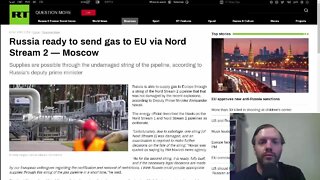 7:11
7:11
crcook84
1 year agoRussia ready to send gas to EU via Nord Stream 2
22 -
 1:58
1:58
Last World News Channel
1 year agoI fought for Ukraine, I picked the side and we lost
10 -
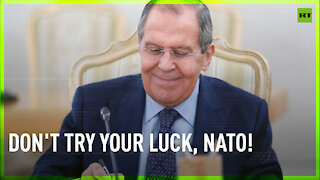 0:22
0:22
RT
2 years ago‘Don’t try your luck’ | Russian FM says Russia will not join NATO
1031 -
 1:17:04
1:17:04
Nation News HPZ
11 months agoUkraine of the Offensive ? BRICS on the Rise, France to Lead The NWO?
125 -
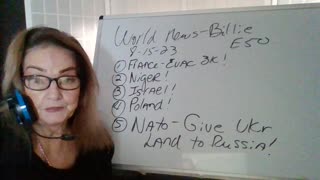 17:54
17:54
BBeene
9 months ago $4.99 earned81523 France Evac 3K! Niger! Israel! Poland! Ukr Give Land to Russ Then Ukr in NATO! W Billie 50
2.5K7 -
 1:41
1:41
RCF - Real Combat Footage: Unfiltered Perspectives on War Military Actions and Conflicts
7 months ago🚀🇺🇦 Ukraine Russia War | Falcon Squad Takes Down Russian BTR-82A | RCF
24 -
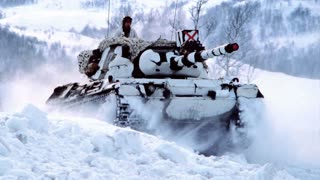 3:03
3:03
Rumor has it
1 year agoUkraine to get more Western tanks from Germany, the Netherlands and Denmark
6 -
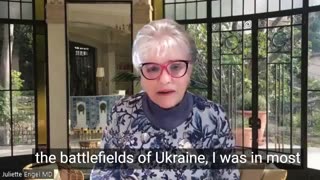 1:57
1:57
redpilluniversity
10 months agoJuliette Engel on Russia & Ukraine: Heads They Win, Tails We Lose...
1.38K -
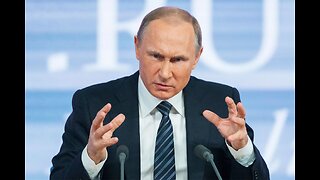 1:36:13
1:36:13
OFF GRID DESERT FARMING NEWS WITH PAUL & ADRIENNE
9 months agoBREAKING NEWS: RUSSIA TO FINISH OFF UKRAINE & TAKE Nikolaev-ODESSA & REACH TRANSNISTRIA !!
22.4K196